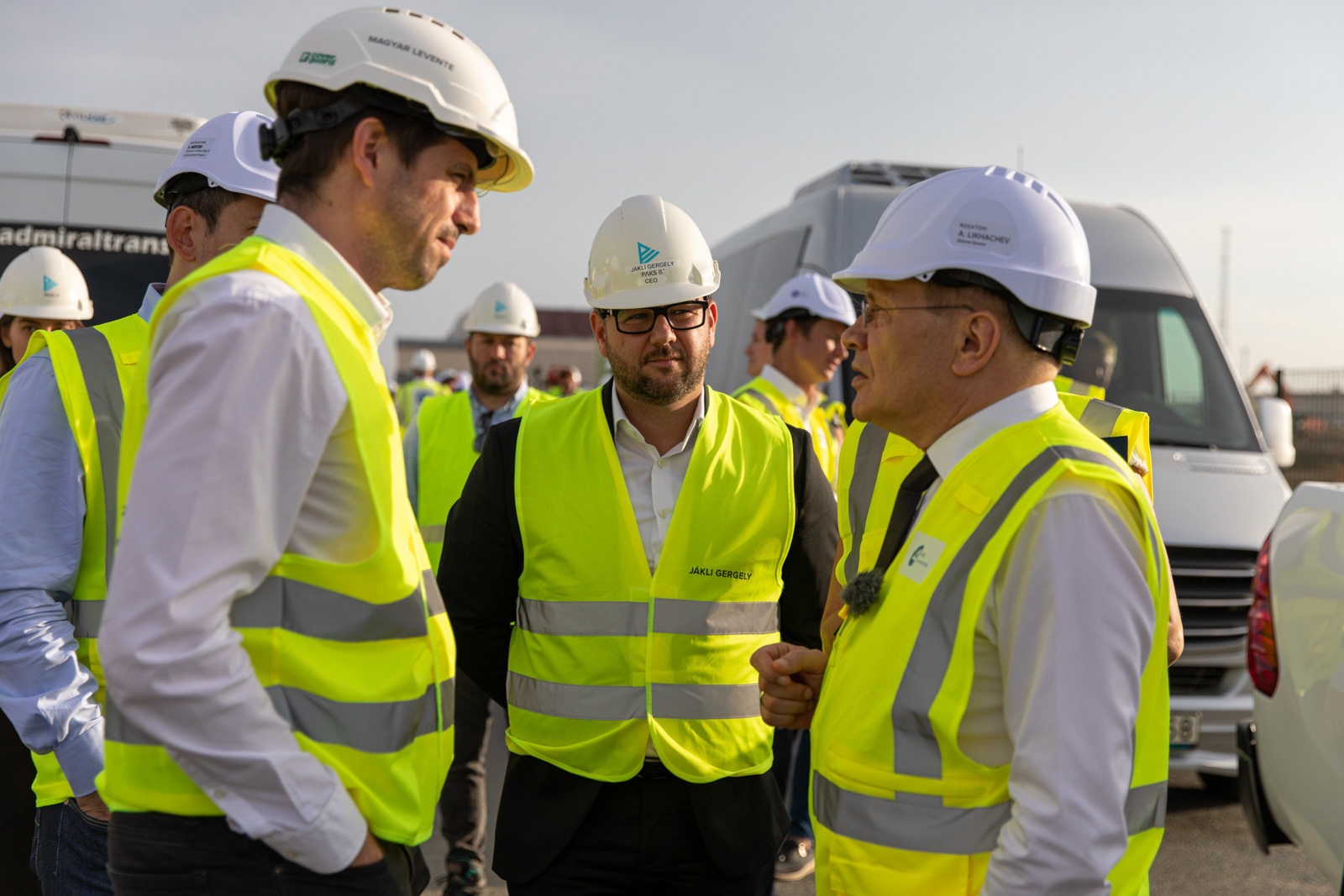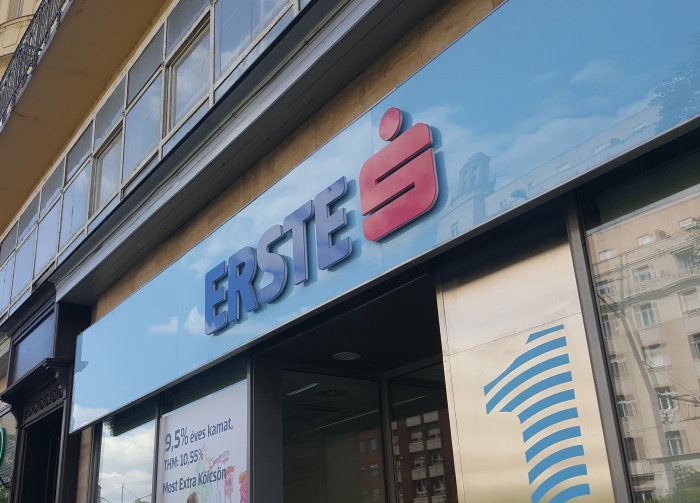Szijjártó: Nuclear Power Could Mean More Energy Security for Hungary

From left, Deputy Minister at the Ministry of Foreign Affairs and Trade Levente Magyar, Gergely Jákli, CEO of Paks II NPP Ltd., and Alexey Likhachev, director general of Rosatom, and at the Paks 2 site.
The construction of the additional nuclear power units at Paks is on schedule and on course to make Hungary a more competitive country while protecting the environment, Minister of Foreign Affairs and Trade Péter Szijjártó insisted in Vienna on Sep. 25.
“Nuclear energy is still under serious political and ideological attacks in Europe, although if we ask the question of how to produce electricity in large quantities at a competitive price, safely while protecting the environment, then nuclear energy is the solution,” Szijjártó declared at the 67th general assembly of the International Atomic Energy Agency (IAEA).
He added, “With the Paks expansion, Hungary will prevent the emission of 17 million tons of carbon dioxide annually. So, not only do we make the country more competitive, and not only do we guarantee the security of our energy supply, but we can also make a great contribution to the protection of the environment.”
Alexey Likhachev, CEO of the Russian nuclear energy company Rosatom, visited the Paks II project site (130 km south of Budapest by road) on Sep. 22, noting that “all obstacles to the Paks II project had been removed in the course of preparations and acquiring permits in the past years.” He added, “Hungarian companies would account for 40% of the value added.”
Deputy Minister at the Ministry of Foreign Affairs and Trade Levente Magyar said the first concrete could be poured at the site in a year.
Following Likhachev’s visit to Paks, he met with Szijjártó at the IAEA assembly in Vienna. During Szijjártó’s discussions with Likhachev, he pointed out that there is ongoing consultation with Rosatom’s management regarding the investment.
National Interest
“Hungary’s national interest is to be able to use nuclear energy and to be able to do all this in cooperation with Rosatom. The investment in Paks is still a large international project; in addition to Rosatom, American, German and French companies are also involved,” Szijjártó argued.
The minister also commented on the possibility of sanctions from the European Union on the nuclear industry.
“We are constantly receiving news or rumors from Brussels that several European Union member states persistently keep the sanctioning of the nuclear industry on the agenda. This would seriously contradict Hungarian national interests, so, of course, if such a proposal were seriously to arise in the future, we would always veto it on the Hungarian side,” he emphasized.
According to Rosatom, Likhachev was equally bullish about the project’s future. “We thoroughly discussed with Minister Szijjárto the details of this project and issues related to import substitution since the sanctions policy of the West is also hitting this project, but nothing will stop it. I am sure that it will develop at the proper pace and in the interests of the Hungarian people,” he was quoted as saying.
Szijjártó’s talks with Likhachev also centered around the progress of construction at the plant, highlighting that the length of the gap wall has now exceeded one kilometer, while a total of 2,700 meters will be needed during the preparations for the construction of the power plant.
“We will be able to connect the two new blocks to the grid in the early 2030s, thereby greatly contributing to the security of the country’s energy supply and the availability of energy at an affordable price in Hungary,” Szijjártó stated.
Digging Deep
Extraction of the soil under the site of the future block six has begun, and the process is already underway at more than half a million cubic meters. Roughly half of the work has already been completed at the site, while excavation to a depth of five meters has already been completed at the site for reactor number five.
The next task will be soil consolidation, which will start on Nov. 1. At the same time, permits for soil extraction up to a depth of 23 meters will be prepared.
“Rosatom has already ordered the equipment with a long production [lead] time; for example, the production of the reactor jacket has already started in Russia,” shares Szijjártó.
The Hungarian minister also met with his Russian counterpart, Minister of Foreign Affairs of the Russian Federation Sergey Lavrov, on the sidelines of the United Nations General Assembly in New York on Sep. 22. In the statement issued by his ministry, Szijjártó says he reiterated Hungary’s position on the war in Ukraine at the meeting.
“I said that Hungary’s interest is for the war to end as soon as possible. I said that we Hungarians, too, are losing lives in this war, which is why we are pressing for an immediate ceasefire and the start of peace talks as soon as possible,” he emphasized.
According to Szijjártó, Lavrov offered assurances that Russia would continue to deliver “the contracted volume [of crude oil and gas] according to schedule” to Hungary and that “Russia would do the same for the nuclear fuel it supplies Hungary.”
Szijjártó noted that Russia had already delivered 3.3 million tonnes of crude and 4.2 billion cubic meters of gas to Hungary this year.
Editor’s note: The Budapest Business Journal contacted the Hungarian Ministry of Foreign Affairs and Trade for further comment, along with consultancy firms Deloitte, KPMG and PwC, but by the time we went to press, they had not responded on the possible effects of the nuclear power plant on Hungary’s economy, energy security and environmental protection.
According to rosatomnewsletter.com, Hungary’s sole nuclear power plant was built and put into operation from 1982 to 1987 under the Paks NPP Construction Agreement signed in 1966. The Paks Nuclear Power Plant has four VVER-440 reactor units with a total capacity of 1.9 GW. Since their service life was extended recently, they will remain operational until 2037. Rosatom adds that the Hungarian government is considering extending their life to 60 years.
This article was first published in the Budapest Business Journal print issue of October 6, 2023.
SUPPORT THE BUDAPEST BUSINESS JOURNAL
Producing journalism that is worthy of the name is a costly business. For 27 years, the publishers, editors and reporters of the Budapest Business Journal have striven to bring you business news that works, information that you can trust, that is factual, accurate and presented without fear or favor.
Newspaper organizations across the globe have struggled to find a business model that allows them to continue to excel, without compromising their ability to perform. Most recently, some have experimented with the idea of involving their most important stakeholders, their readers.
We would like to offer that same opportunity to our readers. We would like to invite you to help us deliver the quality business journalism you require. Hit our Support the BBJ button and you can choose the how much and how often you send us your contributions.











